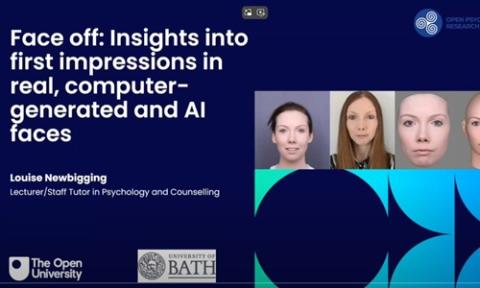Face off: Insights into first impressions in real, computer-generate and AI faces

In this talk, Louise Newbigging focused on the psychology of first impressions, particularly how they are formed through facial perception. While her primary research area centres on faces, she also examines voice and other multimodal elements that contribute to how people perceive others. Her talk was structured to cater to a broad audience with differing levels of familiarity with the subject matter. To achieve this, she began with a historical overview of first impressions research, providing a foundational understanding of how this area has evolved over time.
She then introduced key general concepts in the field of first impressions and explained how these are applied in the study of facial recognition. By doing so, she helped the audience appreciate the underlying psychological mechanisms that shape our immediate judgments of others based on their facial appearance.
In the second half of the lecture, Louise shared insights from her current research. She discussed the specific facial features that tend to drive first impressions and explored how these initial perceptions can go on to influence behaviours and interactions. Her research involves a range of face stimuli, including real faces, dynamic expressions, 3D renderings, computer-generated visuals, and even AI-generated faces.
Louise emphasized the importance of faces in everyday life, noting that they are central not only to social communication but also to broader psychological understanding. By highlighting the diverse types of faces used in her studies, she showcased the complexity and relevance of her research in the digital age—especially with the rise of virtual and AI-based representations of people. This multidisciplinary relevance reinforces why studying facial perception is important not only within psychology but also across various other fields such as technology, marketing, security, and design.
Throughout the talk, Louise conveyed that understanding how and why we form first impressions based on faces is more than an academic exercise—it has real-world applications and implications. From how we hire people to how we engage in social and digital environments; these split-second judgments can have lasting effects. Her work aims to uncover the underlying patterns and psychological processes that inform these initial reactions.
In summary, Louise’s talk offered a comprehensive look at the psychology of first impressions, tracing its historical roots, presenting current research, and highlighting the interdisciplinary importance of understanding facial perception. Her exploration of diverse facial stimuli and their impact on behaviour provided a thought-provoking insight into the subtle yet powerful influence of facial cues in shaping human interactions.
Request your prospectus
![]()
Explore our qualifications and courses by requesting one of our prospectuses today.